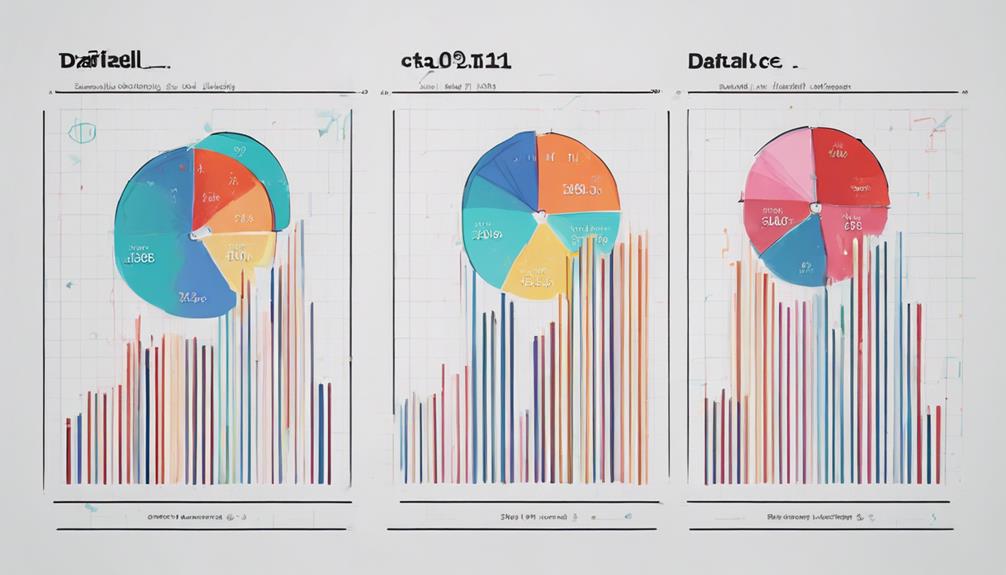Ethical Hacking
Data Science or Ethical Hacking: Which Career Should You Pursue?
Pondering between Data Science and Ethical Hacking? Uncover the key differences to make an informed decision for your future career path.

When determining between Data Science and Ethical Hacking as career paths, it's important to understand their differences. Data Science focuses on data analysis for decision-making using analytics and machine learning. Ethical Hacking concentrates on cybersecurity, identifying vulnerabilities, and strengthening defenses. Data scientists require a background in computer science or statistics, while ethical hackers need expertise in network security. Data scientists earn around $124,074 annually, while ethical hackers make approximately $106,000. Evaluating individual skills, interests, and long-term goals, as well as consulting industry professionals, can help in choosing the right career. Understanding these aspects will aid in making an informed decision.
Key Takeaways
- Assess your interest in data analytics or cybersecurity.
- Consider educational requirements and certifications for each career.
- Evaluate salary potential and job growth projections.
- Compare required skills and responsibilities in both fields.
- Seek guidance from professionals or mentors in Data Science and Ethical Hacking.
Career Overview: Data Science Vs Ethical Hacking
Comparing the career paths of Data Science and Ethical Hacking reveals distinct focuses within the spheres of data analysis and cybersecurity. Data scientists explore the world of data analytics, artificial intelligence, and machine learning techniques, utilizing statistical analysis to extract valuable insights from datasets. Their expertise lies in understanding the uses of data to drive decision-making processes across various industries.
On the other hand, cybersecurity professionals, particularly ethical hackers, concentrate on information security by proactively identifying vulnerabilities in networks and implementing robust security measures. Ethical hackers, also known as white-hat hackers, specialize in penetration testing, vulnerability assessment, and network security to fortify defenses against cyber threats.
While data science careers emphasize the manipulation and interpretation of data, ethical hacking roles revolve around safeguarding systems and networks from malicious attacks, highlighting the significant distinction in the career paths of these two fields.
Educational Paths and Certifications

In the domain of educational paths and certifications, individuals pursuing careers in Data Science and Ethical Hacking set out on distinct learning journeys tailored to their specialized fields of expertise.
Data science typically requires a Bachelor's degree in computer science or statistics, with advanced roles often preferring Master's degrees. Data science certifications such as Certified Analytics Professional (CAP) or SAS Certified Data Scientist can validate expertise in data analysis and machine learning, focusing on programming languages like Python and R, statistical analysis, and machine learning algorithms for effective data interpretation.
On the other hand, Ethical Hacking certifications like Certified Ethical Hacker (CEH) and Offensive Security Certified Professional (OSCP) enhance career prospects in cybersecurity. Ethical hacking courses cover topics such as penetration testing, network security, and ethical hacking methodologies to equip professionals with hands-on skills.
Salary and Job Growth Comparison

When assessing the salary and job growth dynamics between Data Science and Ethical Hacking, it becomes evident that both fields offer lucrative opportunities with distinct earning potentials and projected growth rates.
In the United States, Data scientists command an average annual salary of $124,074, while ethical hackers earn around $106,000 per year. This salary discrepancy indicates that Data scientists have the potential to earn approximately 20% more than ethical hackers in the U.S.
Both professions offer high-paying career paths, with salaries varying based on experience and location. The demand for Data scientists is projected to grow by 36% by 2031, slightly higher than the 35% growth rate anticipated for cybersecurity.
Experienced Data scientists with solid industry experience can earn between $97,000 to $108,000 annually, underscoring the lucrative potential in this field. These figures highlight the competitive yet rewarding nature of both Data Science and Ethical Hacking careers regarding salary and job growth opportunities.
Skills and Responsibilities Analysis

Professionals in the fields of Data Science and Ethical Hacking are crucial by their specialized skill sets and distinct responsibilities. Data scientists excel in statistical analysis, utilizing machine learning algorithms and data visualization techniques to extract valuable insights from vast datasets. Their primary responsibility lies in interpreting data to influence strategic business decisions positively.
On the other hand, Ethical Hackers specialize in penetration testing, ensuring network security, and conducting vulnerability assessments to fortify systems against cyber threats. Their core duty involves identifying and remedying security weaknesses to enhance overall network protection.
Both careers are essential in safeguarding data and networks, with Data Scientists focusing on data-driven decision-making and Ethical Hackers on preemptive security measures. The combination of these specialized skills and responsibilities underscores the significance of professionals in both Data Science and Ethical Hacking domains in today's rapidly evolving technological landscape.
Choosing the Right Career Path

Given the multitude of factors to contemplate, choosing the most suitable career path between Data Science and Ethical Hacking necessitates a thoughtful and strategic approach. When making this critical career choice, individuals should assess their skills, interests, and long-term goals.
Researching industry trends is essential to understanding the demand and growth potential in both fields. Consulting professionals in Data Science and Ethical Hacking can provide valuable insights into the day-to-day responsibilities and challenges each career entails.
Evaluating factors such as job satisfaction, work-life balance, and salary expectations is vital in making an informed decision. Seeking guidance from career counselors or mentors can help align career choices with personal strengths and aspirations.
Ultimately, selecting the right path requires a thorough analysis of all these elements to ensure a fulfilling and successful journey in either Data Science or Ethical Hacking.
Frequently Asked Questions
Which Is Better, Ethical Hacking or Data Science?
When assessing the choice between ethical hacking and data science, it is essential to take into account individual preferences, strengths, and career aspirations. Both fields offer unique opportunities for growth and fulfillment, making the decision a personal one.
Should I Go Into Data Science or Cyber Security?
When deciding between data science and cyber security, consider your passion for analyzing data to drive decisions or protecting data from cyber threats. Both fields require technical skills, but diverge in focus and application.
Who Gets Paid More, a Data Scientist or Cyber Security?
In comparing salaries, data scientists generally earn more than cyber security professionals, with potential for higher long-term earnings. Data scientists can make around $124,000 annually, while cyber security professionals earn an average of $94,000 per year.
Can a Data Scientist Become an Ethical Hacker?
Shifting from data science to ethical hacking is achievable with a focus on cybersecurity principles and specialized training. Understanding network security, penetration testing, and developing skills in ethical hacking methodologies can pave the way for a successful career change.
Conclusion
To sum up, the decision between pursuing a career in data science or ethical hacking ultimately depends on your interests, skills, and career goals. Both fields offer promising opportunities for growth and development, with unique educational paths, certifications, and salary prospects.
Consider your strengths and preferences carefully before making a decision, as each career path requires a different set of skills and responsibilities. Choose wisely, as your choice will shape your future career trajectory.
Ethical Hacking
Which Is Best: Cyber Security or Ethical Hacking?
Baffled by the choice between Cyber Security and Ethical Hacking? Unravel the differences to make the right decision for your digital defense.

Cybersecurity and ethical hacking serve distinct yet complementary purposes in safeguarding digital assets. Cybersecurity focuses on overall system protection and risk management, preventing data breaches and unauthorized access. Ethical hacking, on the other hand, involves identifying vulnerabilities through controlled testing to improve system security. The choice between the two depends on career goals and interests, with cybersecurity offering broader security aspects while ethical hacking explores specific vulnerabilities. Understanding the nuances of each field is essential to make an informed decision.
Key Takeaways
- Cybersecurity focuses on overall system security and data protection.
- Ethical hacking identifies vulnerabilities through penetration testing.
- Both are crucial for safeguarding digital assets.
- Cybersecurity prevents unauthorized access, while ethical hacking proactively identifies risks.
- The choice depends on interest in defending systems (cybersecurity) or finding vulnerabilities (ethical hacking).
Overview of Cyber Security
Cybersecurity, a vital component in safeguarding digital assets, encompasses the protective measures implemented to defend against various cyber threats. This field focuses on information security, network security, and the expertise of cybersecurity professionals in establishing robust security systems.
The primary goal of cybersecurity is to prevent data breaches, unauthorized access, and malicious activities that could compromise the security posture of organizations. By implementing risk management strategies and constantly monitoring for potential threats, cybersecurity professionals work to guarantee the integrity, confidentiality, and availability of sensitive information in digital environments.
Maintaining strong security measures is essential in today's interconnected world, where cyber threats continue to evolve in sophistication and frequency. Cybersecurity certifications such as CISSP, CompTIA Security+, and CEH play a significant role in equipping professionals with the necessary skills to navigate the complexities of cybersecurity challenges effectively.
Organizations rely on the expertise of cybersecurity professionals to protect their valuable assets from cyber threats and safeguard their operations against potential risks.
Fundamentals of Ethical Hacking

Exploring the foundational principles of ethical hacking reveals a strategic approach to identifying and addressing system vulnerabilities.
Ethical hacking, also known as authorized hacking, involves the use of penetration testing tools to conduct system evaluations and pinpoint security flaws.
White Hat hackers, who engage in ethical hacking, play an important role in enhancing system security by proactively identifying potential security risks and suggesting improvements to protect sensitive data from unauthorized access.
Comparison of Roles and Responsibilities

In the field of information security, ethical hackers and cybersecurity professionals each play distinct yet complementary roles in safeguarding digital assets and mitigating cyber threats. Ethical hackers help identify vulnerabilities within a system or network through various forms of penetration testing, aiming to enhance security measures to fortify against potential cyber threats.
On the other hand, cybersecurity experts are primarily responsible for securing systems, analyzing security controls, and preventing unauthorized access to sensitive data. While ethical hacking focuses on testing, validating, and informing organizations about security flaws, cybersecurity encompasses a broader spectrum of security aspects, including monitoring for threats and data recovery post-breach incidents.
Both ethical hacking and cybersecurity are integral parts of safeguarding digital assets in the modern technological landscape, with each discipline bringing a unique set of skills and expertise to the domain of information security.
Key Differences in Objectives

Cybersecurity and ethical hacking differ greatly in their objectives. Cybersecurity primarily focuses on fortifying security measures, analyzing controls, and safeguarding data from potential breaches.
On the other hand, ethical hacking is geared towards identifying vulnerabilities, testing networks, and proposing solutions for bolstering security.
The distinct objectives of each field shape their approach and the ultimate goal they aim to achieve in the domain of digital security.
Goals of Each
One key distinction between ethical hacking and cybersecurity lies in their primary objectives. Ethical hacking, also known as white-hat hacking, focuses on leveraging skills to identify and exploit security vulnerabilities within a system. This field stands in contrast to the vital intentions of Black Hat hackers, as ethical hackers work to benefit the security system by exposing weaknesses that could be exploited by cybercriminals.
On the other hand, cybersecurity professionals aim to protect the system by implementing preventive measures and responding to threats effectively. The emphasis in cybersecurity is on safeguarding systems, networks, and data from unauthorized access and potential breaches. While ethical hacking showcases the benefits of identifying vulnerabilities for improvement, cybersecurity ensures the overall adherence to security policies and the implementation of robust defense strategies.
Both fields play important roles in the ever-expanding cybersecurity market, offering diverse career opportunities to those passionate about protecting digital assets.
Focus and Approach
A fundamental distinction between ethical hacking and cybersecurity is evident in their respective focuses and approaches towards safeguarding digital assets. Cybersecurity strategy primarily revolves around preventing unauthorized access, data breaches, and malicious attacks on systems and networks. On the other hand, ethical hacking involves the deliberate identification of security weaknesses by simulating attacks and conducting penetration testing. While cybersecurity professionals work towards securing systems and monitoring for threats, ethical hackers focus on vulnerability identification and reporting.
To illustrate the variances in focus and approach between ethical hacking and cybersecurity, the table below provides a concise comparison:
| Aspect | Ethical Hacking |
|---|---|
| Objective | Identify security vulnerabilities |
| Techniques | Penetration testing, simulated attacks |
| Emphasis | Network security |
| End Goal | Improve network safety |
| Key Focus | Security weaknesses |
This comparison emphasizes the complementary roles of ethical hackers and cybersecurity professionals in enhancing overall data protection and security within the cybersecurity field.
Skills and Certifications Needed

Proficiency in programming languages, network security, and incident response strategies are essential skills for professionals in the cybersecurity and ethical hacking fields. Cybersecurity experts need a strong technical background in information security to protect systems from cyber threats.
On the other hand, ethical hackers must be well-versed in hacking techniques, penetration testing, and tools like Kali Linux to identify and patch vulnerabilities proactively. Certifications play a vital role in validating the expertise of individuals in the cybersecurity industry. Certifications such as CEH and CISSP are widely recognized for professionals working in either the ethical hacker or cybersecurity domain. Additionally, certifications like CompTIA Security+ and OSCP are commonly pursued to demonstrate proficiency in specific areas of cybersecurity.
Continuous learning is paramount in this ever-evolving field to stay abreast of the latest security trends and technologies. Both cybersecurity and ethical hacking professionals benefit from ongoing education to enhance their skills and adapt to emerging threats effectively.
Career Growth and Opportunities

With a surge in global job growth and substantial salary increases, the cybersecurity field presents abundant opportunities for professionals seeking career advancement and long-term development.
Cybersecurity analysts play an essential role in safeguarding sensitive information by implementing strategies required for cybersecurity. These professionals utilize different types of techniques, such as hacking and penetration testing, to identify and exploit vulnerabilities before malicious actors can do so. By enhancing security measures, cybersecurity analysts contribute to the protection of data and systems, making their expertise highly valuable in today's digital landscape.
The potential for career advancement in cybersecurity is vast, with roles expanding into specialized areas like cloud security, network security, and incident response. As global job growth in cybersecurity continues to soar, professionals in this field have the chance to upskill and progress towards senior positions, further solidifying their long-term prospects.
Regular training and staying informed about the latest trends are essential for those aiming to thrive in the dynamic cybersecurity industry.
Frequently Asked Questions
Can a Ethical Hacker Do Cyber Security?
An ethical hacker can smoothly shift into a cybersecurity role due to their expertise in identifying vulnerabilities, performing penetration testing, and understanding hacker methodologies. Their unique perspective enriches cybersecurity teams by bolstering defenses and enhancing incident response capabilities.
Should I Learn Ethical Hacking for Cyber Security?
Should you learn ethical hacking for cybersecurity? Ethical hacking equips you to proactively identify vulnerabilities, anticipate cyber threats, and design robust defenses. It enhances your cybersecurity skills, making you a well-rounded professional capable of securing systems effectively.
What Is the Salary of Ethical Hacker in Cyber Security?
In cyber security, the salary of an ethical hacker can vary from $50,000 to $120,000 annually, dependent on experience and location. Certifications like CEH and CompTIA Security+ can lead to higher earnings, especially in competitive industries.
Is Ethical Hacking High Paying?
Ethical hacking is a lucrative career path, with average salaries varying between $50,000 to over $100,000 annually. Earning potential is influenced by factors such as experience, specialized skills, industry, location, and certifications, encouraging continual professional development.
What Is the Difference Between a Hacker and a Cybersecurity?
In the domain of cybersecurity, a key distinction lies in the contrasting motives and methodologies of hackers and cybersecurity professionals. While hackers exploit vulnerabilities for personal gain, cybersecurity experts diligently fortify defenses to shield systems from unauthorized access and cyber threats.
Conclusion
In summary, both cyber security and ethical hacking play crucial roles in protecting digital assets and preventing cyber threats.
While cyber security focuses on the overall defense of systems and networks, ethical hacking involves identifying vulnerabilities through authorized testing.
Each field offers unique career opportunities and requires specific skills and certifications for success.
Ultimately, the choice between cyber security and ethical hacking depends on individual interests and career goals, both paths leading to a rewarding and impactful journey in the domain of digital security.
Ethical Hacking
What Is Penetration Testing Vs Ethical Hacking? Know the Difference
Leverage your understanding of penetration testing and ethical hacking to enhance cybersecurity defenses – uncover the distinctions between these crucial strategies.

Penetration testing, known as pen testing, simulates attacks to find vulnerabilities, aiming to strengthen an organization's security. On the other hand, ethical hacking involves techniques to detect security gaps within systems. Pen testers report vulnerabilities, while ethical hackers focus on fixing them, both enhancing defense against cyber threats. Pen testing targets specific vulnerabilities in a set framework, while ethical hacking provides a thorough security assessment. By following structured methodologies and using various tools, both techniques contribute to cybersecurity maturity. Understanding their differences is crucial in ensuring a robust security posture. Further exploration reveals nuances in their methodologies, legal considerations, and industry applications.
Key Takeaways
- Penetration testing pinpoints vulnerabilities within a set framework.
- Ethical hacking aims for a comprehensive security assessment through various techniques.
- Penetration testing exploits weaknesses within predefined scopes for defense.
- Ethical hacking prevents security breaches and strengthens defenses.
- Ethical hackers require permission and follow legal and ethical standards.
Key Concepts and Definitions
Within the domain of cybersecurity, understanding the key concepts and definitions of Penetration Testing and Ethical Hacking is essential for distinguishing their roles and objectives.
Penetration testing, commonly known as pen testing, is a proactive approach to evaluating an organization's security by simulating attacks to uncover vulnerabilities. The focus is on discovering weaknesses in specific areas of the system, providing valuable insights for strengthening defenses.
On the other hand, Ethical Hacking involves employing various hacking techniques and attack methods to identify security loopholes in target systems. Ethical hackers, also referred to as white-hat hackers, require permission before conducting tests and aim to enhance security measures.
Both Penetration Testing and Ethical Hacking play vital roles in cybersecurity, contributing to security maturity modeling, risk management, and overall defense enhancement. While penetration testers concentrate on delivering vulnerability classification reports, ethical hackers focus on improving security systems by identifying and fixing potential security risks.
Ultimately, both practices aim to fortify cybersecurity measures and protect organizations from malicious cyber threats.
Objectives and Scope

When comparing penetration testing to ethical hacking, it is essential to understand the objectives and scope of each practice. Goals and boundaries are clearly defined in penetration testing, focusing on specific vulnerabilities within a set framework.
On the other hand, ethical hacking encompasses a broader range of testing techniques, aiming to simulate real-world cyberattacks for thorough security assessment.
Goals and Boundaries
The goals and boundaries of penetration testing and ethical hacking delineate their distinct objectives and scopes within cybersecurity assessments. Penetration testing, performed by a penetration tester, focuses on identifying vulnerabilities and quantifying risks within predefined scopes. This type of security test aims to exploit weaknesses to provide insights for defensive resolutions.
In contrast, ethical hacking, as part of the broader field of cybersecurity, encompasses a wider range of cyberattacks to prevent security breaches. Ethical hackers, unlike penetration testers, work on enhancing security measures rather than solely exploiting vulnerabilities. The scope of penetration testing is limited to specific areas designated for assessment, while ethical hacking takes a more thorough approach to evaluate overall security posture.
Additionally, ethical hackers are required to obtain permission before conducting security exercises, ensuring that their activities align with legal and ethical standards.
Testing Techniques Explained
Testing techniques in penetration testing and ethical hacking differ in their objectives and scope, highlighting distinct approaches to cybersecurity assessments.
- Penetration testing focuses on evaluating specific vulnerabilities within defined IT system scopes, aiming to exploit weaknesses and quantify risks for vulnerability classification reports.
- Ethical hacking, on the other hand, encompasses a broader range of cyberattack techniques, seeking to thoroughly identify vulnerabilities and develop countermeasures.
- Penetration testing is more targeted, analyzing particular risks within a limited scope, while ethical hacking is proactive and extensive, requiring permission to test security measures thoroughly.
- Both techniques play a critical role in enhancing cybersecurity by contributing to risk management, security maturity modeling, and the continuous improvement of security systems.
Methodologies and Techniques

When comparing the methodologies and techniques used in penetration testing and ethical hacking, it's crucial to understand the distinct approaches each discipline employs.
Penetration testing typically follows structured methodologies such as the OSSTMM or NIST SP 800-115 to systematically assess vulnerabilities within a system or network.
On the other hand, ethical hacking involves a broader range of hacking tactics, utilizing tools like Metasploit, Nmap, or Burp Suite to thoroughly test security measures and identify potential weaknesses.
Testing Approaches
In evaluating security measures, penetration testing and ethical hacking employ distinct methodologies and techniques.
- Penetration testing typically follows a structured methodology like the Penetration Testing Execution Standard (PTES) to assess vulnerabilities systematically.
- Ethical hacking employs various techniques such as social engineering, network scanning, and malware analysis to identify and exploit security weaknesses.
- Penetration testers use tools like Metasploit, Nmap, and Burp Suite for vulnerability assessment and exploitation during testing engagements.
- Ethical hackers may utilize tools like Wireshark, John the Ripper, and Aircrack-ng to uncover system vulnerabilities and potential attack vectors.
Both penetration testing and ethical hacking necessitate a blend of manual testing, automated tools, and creativity to effectively uncover and exploit security vulnerabilities. The methodologies and tools used in these approaches are tailored to reveal weaknesses in systems and networks, providing valuable insights for enhancing overall security posture.
Hacking Tactics
Utilizing various sophisticated methodologies and techniques, hacking tactics in both ethical hacking and penetration testing encompass a diverse range of approaches to assess and exploit security vulnerabilities. Ethical hackers, certified by organizations like EC-Council, employ techniques such as social engineering, phishing, and malware analysis to find vulnerabilities within systems.
On the other hand, penetration testers focus on methodologies like white-box, black-box, and grey-box testing to uncover weaknesses in cybersecurity defenses. Ethical hackers utilize tools like Metasploit, Wireshark, and Nmap to simulate cyberattacks and enhance security measures. In contrast, penetration testers leverage techniques like SQL injection, cross-site scripting, and buffer overflow to assess the effectiveness of security controls.
Both disciplines require a profound understanding of hacking tactics and tools to conduct thorough assessments and maintain robust cybersecurity postures. Ultimately, the difference between ethical hacking and penetration testing lies in their specific objectives and the depth of exploitation they undertake to fortify cyber defenses.
Legal and Ethical Considerations

Adhering to legal and ethical guidelines is vital in both ethical hacking and penetration testing to guarantee compliance and respect for privacy rights. When engaging in security assessments, professionals in these fields must consider several key factors:
- Ethical hackers are required to obtain explicit authorization from the target organization before conducting any assessments to make sure they are acting within legal boundaries.
- Penetration testing, if done without proper authorization, can lead to legal implications and potential consequences for the testers.
- Both ethical hackers and penetration testers must strictly adhere to ethical considerations, ensuring that their actions are morally sound and respectful of privacy rights.
- Following rules and regulations is essential for penetration testers to prevent any legal issues that may arise from unauthorized or non-compliant testing practices.
Reporting and Recommendations

When concluding their evaluations, professionals in both ethical hacking and penetration testing compile detailed reports outlining identified vulnerabilities and proposing security enhancements.
In penetration testing reports, the focus lies on pinpointing vulnerabilities, evaluating associated risks, and providing recommendations to bolster security measures effectively. These reports prioritize quantifying risks and categorizing vulnerabilities based on their severity to guide organizations in prioritizing remediation efforts.
On the other hand, ethical hacking reports offer a more thorough view by delving into system weaknesses and potential threats, alongside offering detailed strategies to fortify cybersecurity defenses and prevent future cyberattacks.
Both types of reports are invaluable resources for organizations, serving as roadmaps towards achieving stronger security postures and safeguarding against malicious intrusions. By meticulously documenting vulnerabilities and suggesting tailored security enhancements, these reports enable businesses to proactively address weaknesses and elevate their overall cybersecurity resilience.
Training and Certification Paths

Professionals pursuing careers in cybersecurity often begin on distinct training and certification paths tailored to their specific focus areas, such as penetration testing or ethical hacking. These paths equip individuals with the necessary skills and knowledge to excel in their roles.
Some key aspects of training and certification paths in penetration testing and ethical hacking include:
- Certifications: Penetration testing often involves certifications like CompTIA PenTest+ or Offensive Security Certified Professional (OSCP), while ethical hacking training typically includes certifications such as Certified Ethical Hacker (CEH) or Offensive Security Certified Ethical Hacker (OSCE).
- Hands-On Practical Skills: Penetration testing courses focus on practical skills to identify and exploit vulnerabilities effectively.
- Hacker Tactics: Ethical hacking certification paths emphasize understanding hacker tactics, techniques, and procedures to secure systems proactively.
- Rigorous Exams: Both penetration testing and ethical hacking certifications require passing rigorous exams to demonstrate proficiency in cybersecurity testing methodologies.
These certification paths ensure that professionals are well-prepared to navigate the complex landscape of cybersecurity testing and defense.
Industry Applications and Trends

The utilization of penetration testing and ethical hacking in various industries reflects a proactive approach towards enhancing cybersecurity measures and safeguarding against evolving cyber threats. Organizations across sectors leverage these practices to diagnose security weaknesses, find vulnerabilities, and guarantee compliance with cybersecurity regulations. As industry applications evolve, the demand for skilled professionals adept in penetration testing and ethical hacking continues to rise.
| Industry Applications | Trends |
|---|---|
| Financial Services | Increasing demand for penetration testing to protect financial data. |
| Healthcare | Ethical hacking used to enhance patient data security and privacy. |
| Technology | Penetration testing employed to secure software and network infrastructure. |
| Government | Compliance with strict cybersecurity standards drives the need for ethical hacking services. |
The growing reliance on digital systems underscores the importance of these practices in fortifying security defenses and safeguarding sensitive information for clients in various sectors.
Frequently Asked Questions
Are Ethical Hackers Also Known as Penetration Testers?
Ethical hackers may encompass penetration testing within their cybersecurity roles, but they are not solely identified as penetration testers. Both roles contribute to cybersecurity, with ethical hackers focusing on prevention and penetration testers on evaluating and strengthening defenses.
What Is the Difference Between Ethical Hacking and Ethical Hacking?
Ethical hacking and penetration testing both involve evaluating systems for vulnerabilities, but ethical hacking encompasses a wider range of hacking techniques. Penetration testing focuses on specific areas within defined scopes, while ethical hacking is more thorough.
What Is the Difference Between Pentest and Penetration Test?
Penetration testing and pentest refer to the same cybersecurity assessment practice. Both terms describe simulated attacks to identify security weaknesses. These tests are essential for organizations to enhance their defenses and safeguard against potential cyber threats.
What Is the Role of Security and Penetration Testers in Ethical Hacking?
Security and penetration testers play an essential role in ethical hacking by identifying vulnerabilities, evaluating security measures, testing policies, developing countermeasures, and enhancing overall cybersecurity systems. Their work contributes to improving security maturity, risk management, and cybersecurity posture.
Conclusion
To sum up, understanding the difference between penetration testing and ethical hacking is essential in the field of cybersecurity.
While both involve identifying vulnerabilities in systems, their objectives, methodologies, and legal considerations differ.
Penetration testing aims to assess the security of a system, while ethical hacking involves actively exploiting vulnerabilities.
By recognizing these distinctions, organizations can better protect their assets and stay ahead of potential cyber threats in today's ever-evolving digital landscape.
Ethical Hacking
What Is Better: Computer Science or Ethical Hacking?
Get a glimpse into the tech world dilemma: Computer Science or Ethical Hacking? Unravel the opportunities and challenges that await in these dynamic fields.

Exploring the choice between Computer Science and Ethical Hacking reveals diverse yet interconnected opportunities in the tech field. Computer Science spotlights programming, data management, and software creation. In contrast, Ethical Hacking centers on cybersecurity testing and defense. Computer Science demands proficiency in programming languages and system design, while Ethical Hacking requires networking and security skills. Job demand for both fields is strong, with Computer Science offering growth in software engineering and data science, and Ethical Hacking in security analysis and penetration testing. The decision hinges on personal interests and career aspirations in technology. Further insights await into these compelling technological domains.
Key Takeaways
- Computer Science offers a broader understanding of computing principles and technology domains.
- Ethical Hacking focuses on cybersecurity, penetration testing, and safeguarding against cyber threats.
- Computer Science provides a foundation in software development, algorithms, and data structures.
- Ethical Hacking offers specialized skills in computer networking, risk management, and cryptography.
- Both fields have promising career paths, with Computer Science in software development and Ethical Hacking in cybersecurity.
Overview of Computer Science
What is the fundamental scope of Computer Science?
Computer Science is a vast field that encompasses the study of computers, data structures, algorithms, programming, systems, software development, cybersecurity, and much more. It explores the theoretical foundations of computation and the practical applications of designing and implementing software systems.
In the domain of data structures and algorithms, Computer Scientists work on organizing and managing data efficiently, enabling faster and more effective processing. They also focus on developing secure systems to protect information from cyber threats, making cybersecurity an essential aspect of the field.
Career opportunities in Computer Science are diverse, ranging from software development to network administration to research in artificial intelligence. Professionals in this field are highly sought after by industries worldwide, with tech giants like Google and Microsoft actively recruiting Computer Science experts.
Overview of Ethical Hacking

Ethical hacking, a practice essential for enhancing cybersecurity defenses, involves legally penetrating systems to uncover vulnerabilities. White-hat hackers, also known as ethical hackers, play a pivotal role in helping organizations strengthen their security measures. One popular certification in this field is the Certified Ethical Hacker (CEH), which showcases expertise in identifying and addressing security issues within computer systems.
| Aspect | Details | Importance |
|---|---|---|
| Cybersecurity Defenses | Ethical hacking enhances the overall security posture of organizations | High |
| Vulnerabilities | Identifying weaknesses in systems to prevent exploitation | Critical |
| Security Measures | Implementing robust protocols to mitigate risks | Essential |
| Organizations | Engaging ethical hackers to assess and improve cybersecurity | Strategic |
| Computer Systems | Understanding the intricacies of networks and programming languages | Foundational |
Ethical hacking is key for organizations to proactively assess their cybersecurity posture and safeguard against potential threats effectively.
Skill Sets Required

Proficiency in programming languages, data structures, and software development methodologies is essential for computer science professionals, enabling them to design and optimize computing systems.
In contrast, ethical hackers require skills in computer networking, penetration testing, and risk management to identify and remedy security vulnerabilities.
While computer scientists focus on creating robust software solutions, ethical hackers specialize in fortifying systems against cyber threats, showcasing the distinct yet complementary skill sets needed in these fields.
Skills for Computer Science
Computer science professionals must possess a strong foundation in programming languages such as Java, Python, and C++ to excel in developing software applications.
In addition to programming languages, understanding data structures like arrays, linked lists, and trees is essential for efficiently organizing and manipulating data.
Proficiency in algorithm design and analysis is vital for computer science specialists to solve complex computational problems effectively.
Additionally, familiarity with software development methodologies such as Agile and Scrum is necessary for managing projects efficiently and adapting to changing requirements.
Furthermore, a solid grasp of computer systems, including hardware components and operating systems, is indispensable in the field of computer science. This knowledge enables professionals to comprehend the underlying technologies on which software applications run and to optimize performance.
Abilities in Ethical Hacking
An adept practitioner in ethical hacking demonstrates proficiency in a range of technical competencies essential for identifying system vulnerabilities and enhancing cybersecurity measures. Ethical hackers must possess a deep understanding of computer networking, various programming languages, cryptography principles, and database systems. These skills enable them to conduct penetration testing, analyze security weaknesses, and fortify systems against cyber threats.
Furthermore, ethical hackers play a critical role in risk management, intrusion detection, and maintaining network security. By staying abreast of the latest cyber threats and vulnerabilities, they can help organizations preemptively address potential breaches. It is important to note that ethical hackers operate within legal boundaries, unlike their malicious counterparts known as black hat hackers.
In essence, the abilities required in ethical hacking are multifaceted and demand continuous learning and adaptation to combat evolving cybersecurity challenges effectively. Ethical hackers serve as invaluable assets in safeguarding sensitive data, resolving technical issues, and bolstering overall cybersecurity defenses.
Education and Certifications

Education in computer science typically encompasses a wide range of foundational topics essential for understanding the core principles of computing. A computer science degree often involves formal education in mathematics, programming languages, and computer science fundamentals. Courses typically cover algorithms, data structures, software development, and computer systems.
On the other hand, ethical hacking certifications, such as the Certified Ethical Hacker (CEH), focus on validating expertise in penetration testing, vulnerability assessment, and ethical hacking techniques. Ethical hacking training emphasizes practical skills like network security, cryptography, and ethical hacking methodologies.
Both fields require continuous learning to keep pace with industry advancements. While computer science provides a broader understanding of computing principles, ethical hacking certifications offer specialized knowledge in cybersecurity and penetration testing. Individuals interested in these fields should consider their career goals and preferences when choosing between a computer science degree and pursuing ethical hacking certifications.
Career Paths in Computer Science

Career paths in computer science offer a diverse array of options, ranging from software development to network engineering.
Specializations within the field, such as artificial intelligence and machine learning, provide opportunities for professionals to focus on specific areas of interest.
With the increasing demand for computer science expertise across industries, pursuing a career in this field can lead to rewarding opportunities and competitive salaries.
Career Options in CS
Professional opportunities in computer science encompass a diverse array of roles, including software developers, data scientists, network engineers, web developers, and database administrators. Within the domain of computer science, individuals have a wide range of career options to explore.
These professionals can find employment in various industries, ranging from tech giants like Google to startups and government agencies. Specializations within computer science further expand the career paths available, with options such as artificial intelligence, machine learning, cybersecurity, and software engineering.
Job titles within the field of computer science vary from entry-level software developer positions to senior AI/machine learning engineer roles, each offering distinct responsibilities and corresponding salary ranges.
Pursuing a career in computer science not only opens doors to a multitude of job opportunities but also highlights the significance of the field in today's digital age, making it a compelling choice for individuals interested in technology and innovation.
Specializations Within CS
In the domain of computer science, individuals can pursue specialized career paths that cater to various interests and skill sets, encompassing fields such as artificial intelligence, machine learning, cybersecurity, and software engineering.
- Cybersecurity: Professionals in this specialization focus on protecting computer systems, networks, and data from cyber threats and attacks, ensuring information security and data privacy.
- Software Engineering: Specializing in software engineering involves designing, developing, and testing software applications, ensuring they meet quality standards and user requirements.
- Data Science: Data scientists work on collecting, analyzing, and interpreting complex data to provide valuable insights for decision-making processes.
These specializations offer diverse opportunities within the computer science field, allowing individuals to explore different aspects of technology and contribute to areas such as network security, ethical hacking, computer networks, and more.
Professionals in these roles play an important part in the digital landscape, addressing the growing demand for secure and innovative technological solutions.
Industry Demand for CS
The increasing reliance on technology in various sectors has heightened the demand for skilled individuals in the field of computer science. As industry demand for computer science professionals continues to rise, individuals pursuing careers in this field can expect to find a wealth of opportunities.
With a projected growth of 15% through 2029, the need for skilled computer science professionals remains strong. A variety of career paths await, including roles such as software developers, data scientists, network engineers, web developers, and database administrators. These professionals can anticipate median salaries ranging from approximately $73,000 to $122,000 per year, reflecting the value placed on their expertise.
Specializations in areas like artificial intelligence, cybersecurity, and machine learning offer diverse and rewarding career opportunities within the domain of computer science. By honing their skills in these specialized fields, individuals can contribute significantly to the development and advancement of technology across various industries.
Career Paths in Ethical Hacking

Career opportunities in ethical hacking encompass roles such as penetration testers, security analysts, and security consultants. These professionals play an essential role in safeguarding organizations from cyber threats by identifying and addressing vulnerabilities in their systems and networks. Job growth in the field of ethical hacking is projected at an impressive 31% through 2029, highlighting the increasing need for skilled individuals in this area.
- Ethical hackers perform penetration testing to assess the security posture of systems.
- Security analysts monitor networks for security breaches and investigate violations.
- Security consultants provide expert advice on enhancing overall cybersecurity measures within an organization.
Obtaining certifications like the Certified Ethical Hacker (CEH) can validate one's expertise in ethical hacking and open up further career opportunities. Ethical hackers work diligently to protect sensitive data, prevent cyber attacks, and ensure the security of digital assets, making their roles indispensable in today's technology-driven world.
Salary Comparison

Considering the financial aspects of these professions, a notable comparison lies in the salaries earned by ethical hackers and computer science professionals. Ethical hackers can earn an average salary of around $99,730 per year, indicating the lucrative potential in the field. On the other hand, computer science professionals have an average salary of about $88,240 per year, reflecting the competitive pay scales within the industry. The salary potential for ethical hackers can vary based on experience, certifications, and industry demand, offering opportunities for significant growth. Similarly, computer science salaries can be influenced by factors such as specialization, location, and years of experience, providing a wide range of earning possibilities. Both fields offer rewarding financial incentives, with ethical hacking emphasizing cybersecurity expertise and computer science focusing on software development and technology advancements.
| Profession | Average Salary |
|---|---|
| Ethical Hackers | $99,730 |
| Computer Science Pros | $88,240 |
Industry Demand

The industry demand for computer science professionals and ethical hackers is steadily increasing, offering a plethora of job opportunities for individuals with the requisite skills. Employers are actively seeking professionals who possess expertise in cybersecurity and ethical hacking to combat the rising number of cyber threats in today's digital landscape.
Understanding the specific skills in demand within these fields is essential for individuals considering a career path in computer science or ethical hacking.
Job Opportunities
Demand for skilled professionals in computer science and ethical hacking is on the rise, reflecting a growing need for specialized expertise in the technology industry. Job opportunities in computer science encompass roles such as software developers, data scientists, and network engineers, which are highly sought after in various industries.
On the other hand, ethical hacking offers specialized positions in cybersecurity, including penetration testers, security analysts, and ethical hackers, with a rising demand for proficient individuals in these roles. The industry projects a 15% growth in demand for computer science experts by 2029, indicating a steady increase in job opportunities.
Similarly, cybersecurity roles like ethical hackers and security analysts are expected to see a 31% growth in demand by 2029, highlighting a significant need for professionals with expertise in this field. While both computer science and ethical hacking present abundant job prospects, the specific demand may vary based on industry requirements and technological advancements.
Skills in Demand
Professionals proficient in cybersecurity and computing concepts are highly sought after in today's technology-driven industry landscape. Ethical hacking skills are particularly in demand due to the rising number of cyber threats, with a substantial 31% projected job growth rate through 2029. This growth reflects the critical need for cybersecurity professionals who can protect systems and data from malicious attacks.
On the other hand, computer science skills are also highly valued, with a projected job growth rate of 15%, indicating a steady demand for individuals with expertise in computing concepts. The demand for cybersecurity professionals is primarily fueled by the evolving nature of cyber threats and the increasing importance of data protection in the digital age.
Additionally, computer science professionals play a vital role in driving technological advancements across various industries, further underlining the consistent demand for their skills in the job market. Thus, individuals with expertise in cybersecurity and computer science are well-positioned to capitalize on the current industry demand for their specialized skills.
Growth Opportunities

In the domain of career prospects, both computer science and ethical hacking offer substantial growth opportunities in the evolving landscape of technology.
- Ethical hacking provides avenues for job roles such as penetration testers and security analysts, important in combating the escalating cyber threats prevalent today.
- Computer science encompasses diverse growth opportunities in areas like software development, AI, and networking, allowing professionals to specialize in specific technological domains based on their interests and expertise.
The field of cyber security, where ethical hacking skills are paramount, is projected to witness a robust growth rate of 31% by 2029, emphasizing the critical need for experts in data protection. On the other hand, computer science professionals can expect a steady job growth rate of 15%, reflecting the continuous demand for their skills in various computing applications and innovations.
Both disciplines offer promising career trajectories in the ever-expanding world of technology.
Personal Interests and Preferences

When considering a career path in technology, personal interests and preferences play a pivotal role in determining whether computer science or ethical hacking is better suited to an individual's aspirations. Computer science caters to those fascinated by software development, algorithms, and system architectures, providing a solid foundation in computing principles. On the other hand, ethical hacking appeals to individuals passionate about cybersecurity, penetration testing, and network security, focusing on safeguarding systems from cyber threats.
| Personal Interests | Computer Science | Ethical Hacking |
|---|---|---|
| Software Development | In-depth study of software creation and design. | Emphasis on securing systems and networks. |
| Algorithms | Focus on algorithmic problem-solving and optimization. | Application of algorithms to identify and prevent security vulnerabilities. |
| System Architectures | Understanding and designing complex computing systems. | Evaluating and enhancing system security measures. |
Understanding one's personal interests, preferences, and career goals is essential in choosing between computer science and ethical hacking, as each field offers distinct opportunities and challenges aligned with individual aspirations.
Frequently Asked Questions
Who Earns More Ethical Hacker or Software Engineer?
In the field of technology careers, the comparison between the earning potential of ethical hackers and software engineers is an intriguing one. Factors such as specialized roles, certifications, and demand for specific skills contribute to the varied salary ranges in these professions.
Which Is Better, Computer Science or Cyber Security?
Computer science encompasses a wide array of computational theories and software development, while cybersecurity focuses on safeguarding digital systems from threats. The choice between the two fields hinges on personal interests and career aspirations, both offering distinct opportunities for growth and specialization.
Is Computer Science Good for Ethical Hacking?
Computer science serves as a solid foundation for ethical hacking by imparting skills in programming, algorithms, and system analysis. Understanding computer science principles can greatly benefit ethical hackers in evaluating systems, identifying vulnerabilities, and crafting robust security measures.
What Is the Best Degree for a Hacker?
The best degree for a hacker is one that provides a strong foundation in programming, algorithms, system architecture, cybersecurity, and ethical hacking practices. Specialized degrees in cybersecurity or ethical hacking offer in-depth knowledge and practical skills essential for success in the field.
Conclusion
To sum it up, when contemplating whether to pursue a career in computer science or ethical hacking, it ultimately comes down to personal interests and preferences. As the saying goes, 'different strokes for different folks.'
Both fields offer unique opportunities for growth, lucrative salaries, and high demand in the industry. Whether you are drawn to the technical aspects of computer science or the ethical challenges of hacking, there is no right answer – just choose the path that aligns best with your skills and passions.
-

 Hackathons5 months ago
Hackathons5 months agoDo Hackathons Look Good on Resume: Participating in Hackathons Is an Impressive Accomplishment to Highlight on Resumes.
-

 Hackathons5 months ago
Hackathons5 months agoRemote Hackathons: Virtual Hackathons Enable Global Teams to Collaborate Remotely.
-

 Hackathons5 months ago
Hackathons5 months agoMIT Hackathons: the Prestigious MIT Hosts Innovative Student-Led Hackathons in Boston.
-

 Ethical Hacking4 months ago
Ethical Hacking4 months agoWhich Is Best: Cyber Security or Ethical Hacking?
-

 Ethical Hacking4 months ago
Ethical Hacking4 months agoWhat Is Better: Computer Science or Ethical Hacking?
-

 Hackathons5 months ago
Hackathons5 months agoHow to Find Hackathons: Discover Upcoming Hackathon Opportunities Through Community Forums and Listing Platforms.
-

 Technology3 months ago
Technology3 months agoGlobal Shutdown: Drastic Microsoft Outage Impact
-

 Hackathons5 months ago
Hackathons5 months agoInternal Company Hackathons: Corporations Leverage Internal Hackathons to Crowdsource Ideas and Drive Innovation.








